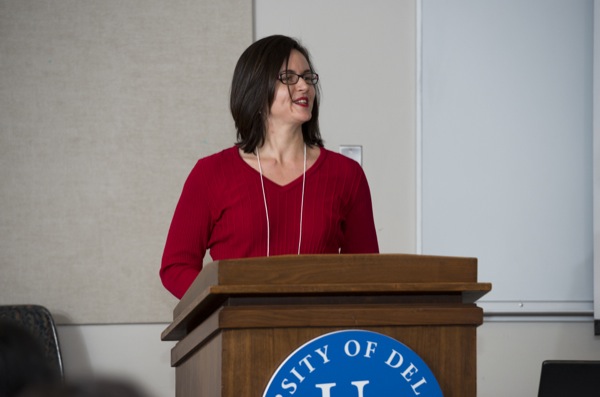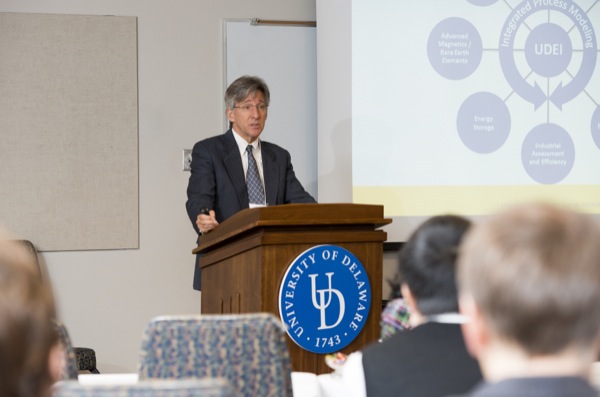


Wind energy
Experts explore future of wind energy research in two-day symposium at UD
2:09 p.m., March 5, 2013--How would wind turbines in the ocean alter the wind flow? Is wind energy a practical solution for powering electrical grids?
Forward-looking questions such as those were addressed by experts in the field of wind energy last week at a symposium sponsored by the University of Delaware Energy Institute (UDEI). The two-day event, titled “The Importance of Meteorology to Wind Energy: Research Needs for the Next 10 Years,” convened researchers from academia, industry and government on Feb. 27-28 to discuss hot topics in wind energy and directions for future research.
Research Stories
Chronic wounds
Prof. Heck's legacy
“We targeted trying to identify what the research needs are for the next decade,” said organizer Cristina Archer, associate professor of physical ocean science and engineering and geography in the College of Earth, Ocean, and Environment.
On the first day, presenters explained meteorological applications to inland and offshore wind energy generation, from forecasting wind power to computer modeling of the windy wakes that turbines create. Guest speakers included Luca Delle Monache of the National Center for Atmospheric Research, Mark Jacobson of Stanford University and Sang Lee of the National Renewable Energy Laboratory.
On the second day of the symposium, participants prioritized research needs that would help assist the offshore wind power industry in U.S. and global markets.
The most urgent need that the group identified was to have continuous, publicly available, meteorological observations offshore along the East Coast to better understand the marine environment there and validate model results. Refurbishing the existing — but damaged — meteorological tower at Cape Wind, near Nantucket Sound, was the unanimously recommended first step.
In addition, the researchers intend to address uncertainties in wind predictions, especially since wind forecasts are used for decision-making within electric utilities. Fulfilling these two needs, namely more offshore observations and better uncertainty characterization, would benefit at least three aspects of wind energy research: resource assessment, wind forecasting and reduction of turbine and wind farm wake losses.
The findings will be summarized in a report to help guide policy and funding agencies in the future.
CEOE Dean Nancy Targett welcomed the group and described the development of the wind turbine at UD’s Hugh R. Sharp Campus in Lewes, which some attendees visited. The turbine both generates electricity for the campus and serves as a research platform.
“It’s been a wonderful training ground for some of our students,” Targett said.
The symposium was part of a series sponsored by the UD Energy Institute, with other topics including fuel cells and solar technology. The institute’s director, Michael Klein, gave an overview of energy research at the University within various disciplines and noted opportunities to expand emphasis on renewable energy areas.
“This workshop is one mechanism to put together experts and identify what the issues are,” Klein said.
About UDEI
The University of Delaware Energy Institute was established in 2008 to marshal and expand the University’s science, engineering and public policy expertise in new and emerging energy technologies and, with its industry and government partners, to use this research to address the entire spectrum of challenges posed by future energy needs. UDEI’s roles include evaluating and creating needed energy information, building teams for required research improvements, providing the bases for decision making, serving as a point of contact, supporting associated energy centers and institutes, and disseminating information through a website, annual symposia and workshops focused on specific technologies and issues.
About UD’s College of Earth, Ocean, and Environment
Founded in 1970, UD’s College of Earth, Ocean, and Environment brings the latest advances in technology to bear on both teaching and conducting ocean, earth and atmospheric research. The college comprises the School of Marine Science and Policy, the Department of Geological Sciences and the Department of Geography, offering both undergraduate and graduate degrees using an interdisciplinary approach to environmental science.
Article by Teresa Messmore
Photos by Kathy F. Atkinson









